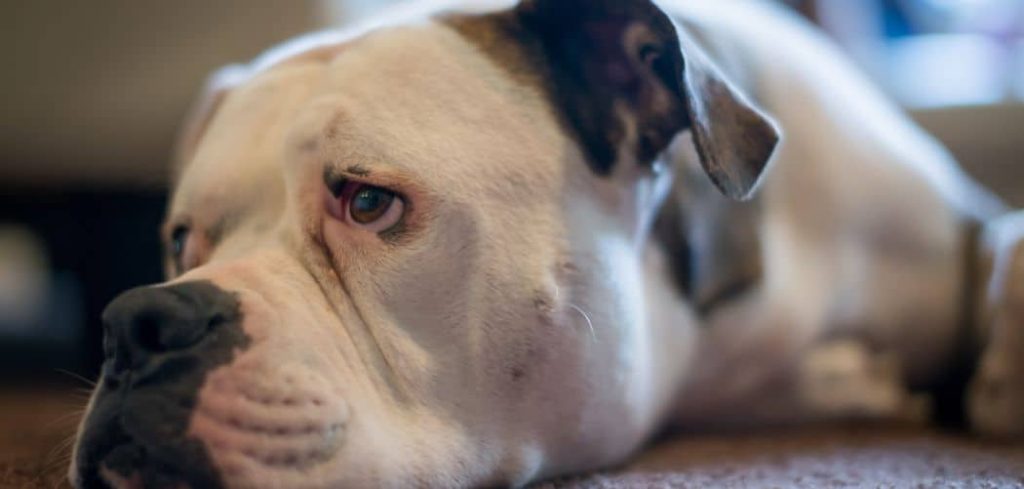It can be unsettling to notice your dog drooling and licking excessively at night when the household is quiet and resting.
While an occasional lick or bit of drool may be normal, persistent or sudden changes often point to an underlying health concern.
We outline the common causes of excessive drooling and licking in dogs at night, what you can do, and when to seek veterinary help.
Table of Contents
Dog Drooling and Licking Excessively at Night — Why It Happens
A dog may excessively drool and lick at night due to nausea, dental disease, or acid reflux may cause a dog to lick and salivate more when lying down. Anxiety or stress can also trigger restless licking behaviors, especially at night. Other possibilities include toxin exposure, oral pain, or neurological conditions that disrupt normal swallowing.
Excessive nighttime drooling and licking often indicate that something is wrong physically or emotionally.

Dog Drooling and Licking Excessively at Night: Common Causes
Dental or Oral Problems
Dental disease, broken teeth, or gum infections are among the most frequent reasons for nighttime drooling. Pain in the mouth often worsens when a dog is resting, causing them to lick excessively in response.
Owners may notice bad breath, red gums, or reluctance to chew hard food. Excessive drooling paired with licking is a red flag for oral discomfort that should not be ignored.
Read more: Dog Salivating Excessively at Night (Why it happens)
Nausea or Acid Reflux
Just like people, dogs can feel nauseous at night, which triggers both licking and salivation. Acid reflux is particularly likely to cause nighttime symptoms, since stomach acid rises more easily when lying down.
A dog experiencing reflux may lick floors, blankets, or the air, in addition to swallowing repeatedly. Left untreated, this discomfort can lead to reduced appetite and weight loss.
Anxiety and Stress
Nighttime often heightens stress for anxious dogs. Separation anxiety, noise sensitivity, or general restlessness may manifest as compulsive licking and drooling.
Dogs experiencing nighttime anxiety may pace, whine, or seek extra closeness. If paired with salivation, these behaviors often point to emotional distress rather than a primary medical condition.
Ingesting Toxins or Irritants
Exposure to household cleaners, plants, or certain foods can cause mouth irritation and excessive drooling. Some toxins produce delayed effects, showing up at night when a dog is resting.
Alongside licking and drooling, owners may notice pawing at the mouth, vomiting, or diarrhea. This is always a medical emergency, as some toxins can be life-threatening.
Gastrointestinal Disorders
Conditions such as gastritis, pancreatitis, or inflammatory bowel disease can cause increased salivation, especially when nausea is present. Nighttime symptoms are common because digestion slows while a dog rests.
Dogs with GI issues may show a poor appetite, vomiting, or abdominal discomfort. Excessive nighttime licking of lips, bedding, or the floor often points to internal discomfort.
Neurological Conditions
Seizures, nerve dysfunction, or brain disease can interfere with swallowing and salivation. Some dogs may drool and lick more during nighttime seizure activity, which can be subtle and mistaken for restlessness.
Owners may observe trembling, disorientation, or odd jaw movements. Because neurological causes are serious, veterinary evaluation is essential.
What to Do If Your Dog Is Drooling and Licking Excessively at Night
At home, begin by observing your dog closely. Note when the licking starts, whether drool is clear or foamy, and if other symptoms like vomiting or pawing at the mouth appear. Removing access to potential toxins and checking for obvious oral injuries are safe first steps.
You can also adjust feeding schedules if acid reflux is suspected, offering smaller meals earlier in the evening.
Keeping water available helps prevent dehydration from drooling. For anxiety-related cases, provide comfort items, white noise, or calming routines before bed.
However, if symptoms persist beyond a few nights, medical care is always recommended.
When to Call or Visit Your Vet
Seek veterinary help immediately if your dog shows additional symptoms such as vomiting, diarrhea, tremors, or difficulty swallowing. These can signal poisoning, severe nausea, or neurological problems.
If drooling is excessive enough to soak bedding or your dog seems distressed, prompt evaluation is important. Oral pain, reflux, and toxin ingestion all require timely treatment.
Even in milder cases, drooling and licking that continue for more than a few days should be checked. Chronic nighttime symptoms are rarely harmless and often indicate treatable conditions.
Read more: Dog drooling excessively (What it could mean)
Key Takeaway
Excessive drooling and licking at night is a warning sign that your dog may be in pain, nauseous, anxious, or even exposed to toxins.
While some cases are mild, many require prompt medical attention to ensure your dog’s comfort and safety.
Monitoring closely, making simple adjustments, and seeking veterinary guidance are the best ways to protect your dog’s health.
With care and timely treatment, most causes of nighttime drooling and licking can be successfully managed.
